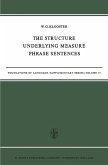C. Neidle
The Role of Case in Russian Syntax (eBook, PDF)
113,95 €
113,95 €
inkl. MwSt.
Sofort per Download lieferbar

57 °P sammeln
113,95 €
Als Download kaufen

113,95 €
inkl. MwSt.
Sofort per Download lieferbar

57 °P sammeln
Jetzt verschenken
Alle Infos zum eBook verschenken
113,95 €
inkl. MwSt.
Sofort per Download lieferbar
Alle Infos zum eBook verschenken

57 °P sammeln
C. Neidle
The Role of Case in Russian Syntax (eBook, PDF)
- Format: PDF
- Merkliste
- Auf die Merkliste
- Bewerten Bewerten
- Teilen
- Produkt teilen
- Produkterinnerung
- Produkterinnerung

Bitte loggen Sie sich zunächst in Ihr Kundenkonto ein oder registrieren Sie sich bei
bücher.de, um das eBook-Abo tolino select nutzen zu können.
Hier können Sie sich einloggen
Hier können Sie sich einloggen
Sie sind bereits eingeloggt. Klicken Sie auf 2. tolino select Abo, um fortzufahren.

Bitte loggen Sie sich zunächst in Ihr Kundenkonto ein oder registrieren Sie sich bei bücher.de, um das eBook-Abo tolino select nutzen zu können.
Zur Zeit liegt uns keine Inhaltsangabe vor.
- Geräte: PC
- ohne Kopierschutz
- eBook Hilfe
- Größe: 18.67MB
Andere Kunden interessierten sich auch für
![Particles and Projections in Irish Syntax (eBook, PDF) Particles and Projections in Irish Syntax (eBook, PDF)]() N. DuffieldParticles and Projections in Irish Syntax (eBook, PDF)73,95 €
N. DuffieldParticles and Projections in Irish Syntax (eBook, PDF)73,95 €![Parameters in Old French Syntax: Infinitival Complements (eBook, PDF) Parameters in Old French Syntax: Infinitival Complements (eBook, PDF)]() E. H. PearceParameters in Old French Syntax: Infinitival Complements (eBook, PDF)113,95 €
E. H. PearceParameters in Old French Syntax: Infinitival Complements (eBook, PDF)113,95 €![Italian Syntax (eBook, PDF) Italian Syntax (eBook, PDF)]() L. BurzioItalian Syntax (eBook, PDF)113,95 €
L. BurzioItalian Syntax (eBook, PDF)113,95 €![Features, Categories and the Syntax of A-Positions (eBook, PDF) Features, Categories and the Syntax of A-Positions (eBook, PDF)]() E. HaeberliFeatures, Categories and the Syntax of A-Positions (eBook, PDF)113,95 €
E. HaeberliFeatures, Categories and the Syntax of A-Positions (eBook, PDF)113,95 €![Anaphora in Celtic and Universal Grammar (eBook, PDF) Anaphora in Celtic and Universal Grammar (eBook, PDF)]() R. HendrickAnaphora in Celtic and Universal Grammar (eBook, PDF)73,95 €
R. HendrickAnaphora in Celtic and Universal Grammar (eBook, PDF)73,95 €![Flexible Syntax (eBook, PDF) Flexible Syntax (eBook, PDF)]() A. NeelemanFlexible Syntax (eBook, PDF)73,95 €
A. NeelemanFlexible Syntax (eBook, PDF)73,95 €![The Structure Underlying Measure Phrase Sentences (eBook, PDF) The Structure Underlying Measure Phrase Sentences (eBook, PDF)]() W. G. KloosterThe Structure Underlying Measure Phrase Sentences (eBook, PDF)40,95 €
W. G. KloosterThe Structure Underlying Measure Phrase Sentences (eBook, PDF)40,95 €-
-
-
Zur Zeit liegt uns keine Inhaltsangabe vor.
Dieser Download kann aus rechtlichen Gründen nur mit Rechnungsadresse in A, B, BG, CY, CZ, D, DK, EW, E, FIN, F, GR, HR, H, IRL, I, LT, L, LR, M, NL, PL, P, R, S, SLO, SK ausgeliefert werden.
Produktdetails
- Produktdetails
- Verlag: Springer Netherlands
- Seitenzahl: 214
- Erscheinungstermin: 6. Dezember 2012
- Englisch
- ISBN-13: 9789400927032
- Artikelnr.: 43984006
- Verlag: Springer Netherlands
- Seitenzahl: 214
- Erscheinungstermin: 6. Dezember 2012
- Englisch
- ISBN-13: 9789400927032
- Artikelnr.: 43984006
- Herstellerkennzeichnung Die Herstellerinformationen sind derzeit nicht verfügbar.
1. Overview of Case in Russian.- 1. Case in Russian.- 2. The Representation of Case.- 3. Assignment of Case.- 4. The Case of Adjectives.- 5. Agreement.- 6. Second Predicate Modifiers.- 2. Object Case Marking and The Genitive of Negation.- 1. Lexically Governed Alternation.- 2. Genitive of Negation.- 3. Distinct Mechanisms for Genitive Marking.- 4. Other Types of Negation.- 5. Scope, Interpretation, and Distribution of [+Q].- 6. Accusative/Genitive Alternation and Polarity Sensitivity.- 7. The Feature [Q] and Semantics.- 8. Summary.- 3. Apparent Genitive Subjects Within the Scope of Negation.- 1. Demotion.- 2. Do Genitive Subjects Exist?.- 3. Formalization of the Rule of Demotion.- 4. Numeral Phrases and Quantifier Phrases.- 1. Numeral Phrases.- 2. Quantifier Phrases.- 3. Disagreement about Non-agreeing Phrases.- 4. One Million.- 5. Summary.- 5. Subject Case Marking and Case Agreement of Modifiers.- 1. Data.- 2. Adjuncts and Complements.- 3. Agreement and Control Relations.- 4. Comparison with Alternative Accounts.- 5. Conclusions.- 6. Consequences for a Theory of Case.- 1. Long-Distance Phenomena and Control Relations.- 2. Toward a Theory of Russian Case.- 3. LFG and the Theory of Case.- 4. Conclusions.- Appendix I: Abbreviations and Transliteration.- 1. List of Abbreviations for Sentence Glosses.- 2. Transliteration.- Appendix II: Declension Paradigms.- Appendix III: Lexical Functional Grammar.- 1. Organization.- 2. Phrase Structure Rules.- 3. Lexical Entries.- 4. Lexical Redundancy Rules.- 5. Functional Well-Formedness.- 6. Possible Rules.- 7. Theory of Control and Complementation.- 7.1. Complements vs. Adjuncts.- 7.2. Open Complements.- 7.3. Open Adjuncts.- 7.4. Closed Complements.- 7.5. Closed Adjuncts.- 7.6. The Constituency of Complements.- Index of Names.- Indexof Subjects.
1. Overview of Case in Russian.- 1. Case in Russian.- 2. The Representation of Case.- 3. Assignment of Case.- 4. The Case of Adjectives.- 5. Agreement.- 6. Second Predicate Modifiers.- 2. Object Case Marking and The Genitive of Negation.- 1. Lexically Governed Alternation.- 2. Genitive of Negation.- 3. Distinct Mechanisms for Genitive Marking.- 4. Other Types of Negation.- 5. Scope, Interpretation, and Distribution of [+Q].- 6. Accusative/Genitive Alternation and Polarity Sensitivity.- 7. The Feature [Q] and Semantics.- 8. Summary.- 3. Apparent Genitive Subjects Within the Scope of Negation.- 1. Demotion.- 2. Do Genitive Subjects Exist?.- 3. Formalization of the Rule of Demotion.- 4. Numeral Phrases and Quantifier Phrases.- 1. Numeral Phrases.- 2. Quantifier Phrases.- 3. Disagreement about Non-agreeing Phrases.- 4. One Million.- 5. Summary.- 5. Subject Case Marking and Case Agreement of Modifiers.- 1. Data.- 2. Adjuncts and Complements.- 3. Agreement and Control Relations.- 4. Comparison with Alternative Accounts.- 5. Conclusions.- 6. Consequences for a Theory of Case.- 1. Long-Distance Phenomena and Control Relations.- 2. Toward a Theory of Russian Case.- 3. LFG and the Theory of Case.- 4. Conclusions.- Appendix I: Abbreviations and Transliteration.- 1. List of Abbreviations for Sentence Glosses.- 2. Transliteration.- Appendix II: Declension Paradigms.- Appendix III: Lexical Functional Grammar.- 1. Organization.- 2. Phrase Structure Rules.- 3. Lexical Entries.- 4. Lexical Redundancy Rules.- 5. Functional Well-Formedness.- 6. Possible Rules.- 7. Theory of Control and Complementation.- 7.1. Complements vs. Adjuncts.- 7.2. Open Complements.- 7.3. Open Adjuncts.- 7.4. Closed Complements.- 7.5. Closed Adjuncts.- 7.6. The Constituency of Complements.- Index of Names.- Indexof Subjects.







